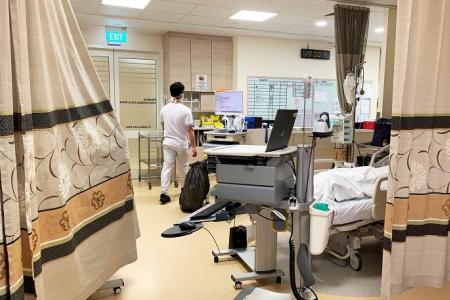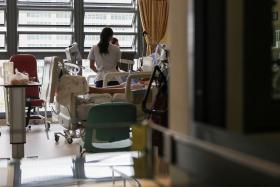Precision medicine added to Medishield Life coverage
Precision medicine therapies will be covered under Medishield Life as part of ongoing measures to keep such treatments affordable for Singaporeans, said Health Minister Ong Ye Kung on Oct 10.
The Health Ministry is also working on new legislation to govern the use of genetic and genomic test data, including the discriminatory use of genetic information in insurance and employment.
The twin measures are key to counter escalating healthcare costs and mitigate the ethical risks of new technologies, which Mr Ong said could be a “double-edged sword”.
“Healthcare is at the verge of a historical technological breakthrough. The unprecedented availability of data can fundamentally transform healthcare,” he said at the opening ceremony of the 22nd Singapore Health & Biomedical Congress.
“In particular, I believe the convergence of three very powerful scientific and policy forces – genomics, AI (artificial intelligence) and the focus on preventive care – will have profound impact on healthcare,” he said.
He said the Medishield Life Council is releasing their recommendations on such therapies next week, and will call for coverage under the national insurance plan to be extended to approved precision medicine therapies.
His ministry intends to accept the recommendation, he said, adding that this will allow approved therapies to be brought into the subsidy, MediShield Life and MediSave support framework.
He noted that while precision medicine will become mainstream clinical practice over time, healthcare financing systems are not designed to fully fund such treatments.
This will lead to serious inequity in healthcare as only the wealthy will be able to afford such treatments, said Mr Ong.
As such, the authorities are taking steps to embrace precision medicine in a sustainable manner, such as by investing in local capabilities to develop such treatments, thus shortening their production times and lowering costs.
Health technology assessment has also been enhanced to “robustly evaluate” the cost effectiveness of high-cost treatments, including precision medicine,” he said.
“Where they are proven to be clinically and cost effective, we will subsidise these therapies,” said Mr Ong.
“We have strengthened health technology assessment to robustly evaluate the cost effectiveness of high-cost treatments, including precision medicine. Where they are proven to be clinically and cost effective, we will subsidise these therapies.”
The Straits Times reported in September that since August, cell, tissue and gene therapy products have been eligible for subsidies, beginning with Kymriah, a type of chimeric antigen receptor (CAR) T-cell therapy, used to treat relapsed or refractory B-cell acute lymphoblastic leukaemia, as well as relapsed or refractory diffuse large B-cell lymphoma.
Mr Ong also spoke on the need to mitigate the risks posed by healthcare technology, noting that while genes can be now be edited to treat disease, such technology could also in theory be used to design babies before they are born or allow companies to select employees based on genetic qualities.
As such, the Ministry of Health (MOH) has worked with the Life Insurance Association to put in place a moratorium on genetic testing and insurance, which disallows the use of genetic test results for insurance underwriting.
The Health Minister added that MOH is also working on new legislation to govern the use of genetic and genomic test data, which aims to address potential undesirable outcomes, such as discriminatory use of genetic information in insurance and employment.
“We will conduct broad consultations and hope to submit the Bill to Parliament in the next one to two years,” said Mr Ong.
Get The New Paper on your phone with the free TNP app. Download from the Apple App Store or Google Play Store now


